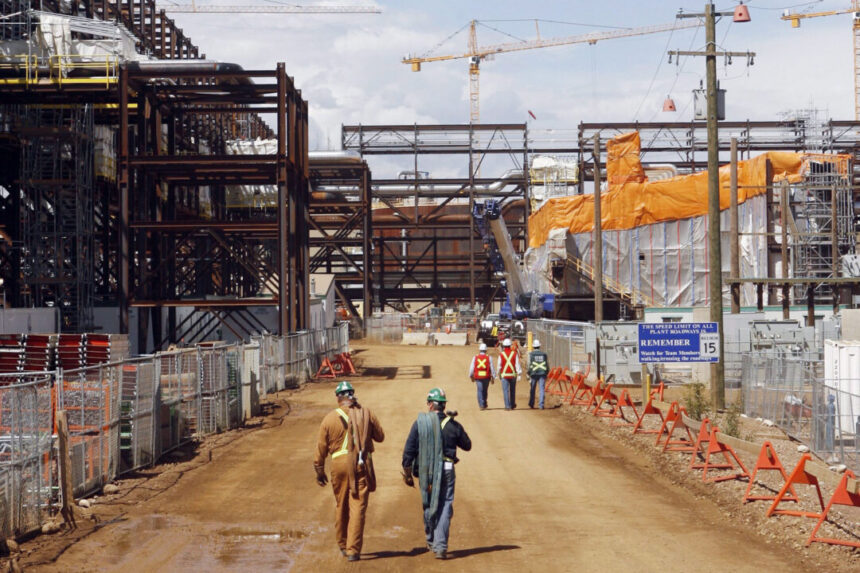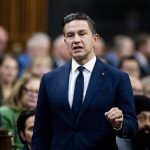Ottawa’s emissions reduction plan could push Alberta into a “deep recession” by 2030, while raising consumer prices nationwide and lowering Canadians’ incomes by 2050, says a new report by the Conference Board of Canada, commissioned by the Alberta government.
The report, published on Jan. 21 and updated on March 24, looks at the potential economic impacts of Canada’s Emissions Reduction Plan (ERP), a set of measures the federal government has proposed to reduce greenhouse gas emissions by 40 to 45 percent relative to 2005 levels by 2030.
This plan includes measures, some underway and others under development, such as carbon pricing, the emissions cap on oil and gas, clean electricity regulations, and electric vehicle sales mandates and incentives, which Ottawa says put Canada on a path to reach net-zero emissions by 2050.
This comes as a federal election has been triggered for April 28, with many of Ottawa’s climate policies, such as the carbon tax, coming under scrutiny amid ongoing trade tensions with the United States.
The Conservatives, led by Pierre Poilievre, as well as the government of Alberta argue that measures such as the industrial carbon tax and emissions cap on oil and gas hurt Canada’s competitiveness and slow economic growth, and that Canada should use technology, not taxes, to lower emissions.
Meanwhile, the Liberals under Mark Carney, who upon taking office signed a directive to reduce the consumer carbon tax rate to zero, maintain that carbon pricing frameworks are key for achieving net-zero emissions, adding that at the same time their measures will help to diversify the economy, and that the costs of pollution should be borne by “big polluters.”
The Conference Board of Canada’s report says the country is not on track to reach its net-zero target. In the most “realistic” scenario the authors propose, emissions would fall by 32 percent in 2030 and by 68 percent by 2050, while bringing about “significant economic costs.”
The report projects that those reductions would result in a 2.6 percent decline in Canada’s employment, a 3.8 percent drop in real GDP, and a 2.5 percent increase in consumer prices by 2050. These estimates are based on the report’s baseline forecast, which assumes emissions will remain close to 700 million metric tons of CO2-equivalent.
Compared to other provinces, Alberta would be “disproportionately impacted by the policies in the ERP,” says the report, noting the significant role of the oil and gas sector in the province’s economy.
“As proposed, the ERP does not fully account for the economic implications of its policies, and the required pace of uptake for critical technologies to reduce emissions are unrealistic,” reads the document. “Alberta would experience a deep recession in 2030 and would subsequently experience slower economic growth compared to our Baseline forecast.”
In the realistic scenario projected by the authors, Alberta’s GDP would drop by 11 percent, employment in the province would decline by 4.1 percent, and government revenues decrease by 9.3 percent by 2050. Also, combined with the increase in price levels by almost 4 percent, disposable income per Albertan would fall by $3,300, adjusted for inflation.
The Epoch Times sought comment from Environment and Climate Change Canada, as well as Natural Resources Canada, but did not hear back by publication time.
Alberta Premier Danielle Smith said the report shows “just how devastating these policies would be,” saying Ottawa “needs to rethink” its approach.
“The federal government’s emissions plan threatens Alberta’s economy, jobs, and the household finances of Alberta families,” she said in a March 24 social media post. “Alberta won’t stand by while our prosperity is put at risk. We need practical solutions that protect both jobs and the environment.”
Smith’s government has strongly opposed a number of federal climate change policies, including the Impact Assessment Act, which introduces federal environmental requirements for major projects such as pipelines; the emissions cap on oil and gas, which Alberta says is a de facto production cap; and Ottawa’s goal of fully decarbonizing electricity grids.
The federal government says it has the authority to enforce measures on issues of national concern, such as climate change, while Alberta sees the measures as overreach into provincial jurisdiction and resource development.
Canada’s 2030 emissions reduction target calls for a 42 percent cut in emissions from the oil and gas sector compared to 2019 levels, with the sector responsible for nearly 30 percent of the total expected emissions reductions across the economy by 2030, according to the report.
Former federal Environment Minister Steven Guilbeault has argued measures like the emissions cap are necessary because the oil and gas sector accounts for a third of Canada’s greenhouse gas emissions. The sector accounted for 31 percent of emissions in 2022, according to a recent National Inventory Report.
The Conference Board of Canada’s report concludes that Ottawa’s 2030 and 2050 targets are “ambitious and likely necessary,” while suggesting that the potential economic impacts should also be considered.












